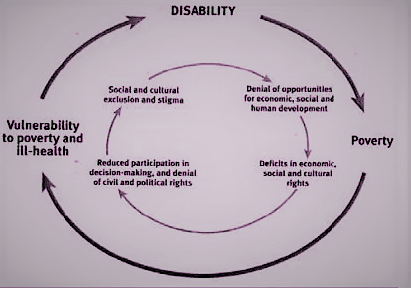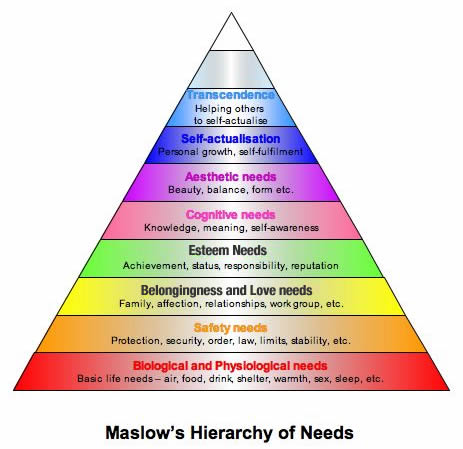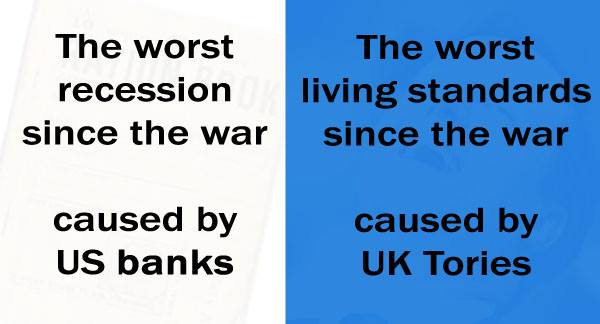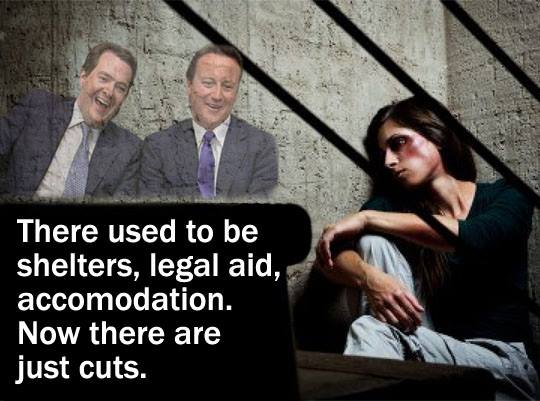
Discrimination on the grounds of disability was made illegal 20 years ago when Parliament passed the Disability Discrimination Act 1995. Further legislative progress was made with the Human Rights Act (2008) and the Equality Act (2010). So discrimination can’t happen now. Right?
Wrong.
Disabled people are not being treated as being equal with other citizens and continue to be denied the respect, dignity, opportunities, an acceptable standard of living and other acceptable outcomes that non-disabled people take for granted.
The government claim that the economy has recovered from the effects of the global recession, but that recovery is not one that is shared equally to include everyone. If the economy is doing as well as the government claims, why are disabled people still facing austerity cuts to their lifeline support, while wealthy citizens are handed out substantial tax cuts?
In one of the wealthiest countries in the world, targeting disabled people, who are much more likely to be living in poverty than other citizens, is absolutely inexcusable. However, the neoliberal right justify their rigid small state, pro-privatisation, deregulation, mythological meritocracy, low tax, high VAT and antiwelfare ideology with folklore economics. “Paying down the debt” has become an almost farcical bare-faced and parroted Conservative lie.

The neoliberal small state “big society”.
The Equality and Human Rights Commission report is the most comprehensive analysis on how (or if) the rights of disabled people are observed and protected in Great Britain. The most recent report says that changes to benefit rules have had a particularly disproportionate, cumulative impact on disabled people’s right to live independently.
According to the report, titled Disability report: Being disabled in Britain, which was published on Monday, the proportion of disabled people with no qualifications was nearly three times that of non-disabled people. (See also: Disabled students fear for their future as independence payments cut).
Fewer than half of disabled adults are in employment (47.6%), compared with almost 80% of non-disabled adults – and the gap between these groups has widened since 2010-11.
Food poverty has affected 18.4% of disabled people aged 16-64, compared with 7.5% of non-disabled people.
David Isaac, Chair of the Commission, commenting on the damning new state of the nation report into life for disabled people, said: “Whilst at face value we have travelled far, in reality disabled people are being left behind in society, their life chances remain very poor, and public attitudes have changed very little.
“This evidence can no longer be ignored. Now is the time for a new national focus on the rights of the thirteen million disabled people who live in Britain. They must have the same rights, opportunities and respect as other citizens.
“We must put the rights of disabled people at the heart of our society. We cannot, and must not, allow the next twenty years to be a repeat of the past.”
The research, which covers six key areas of life, finds that disabled people in Britain are experiencing disadvantages in all of them, and sets out vital areas for urgent improvement.
This includes: a lack of equal opportunities in education and employment; barriers to access to transport, health services and housing; the persistent and widening disability pay gap; deteriorating access to justice; and welfare “reforms” (cuts) significantly affecting the already low living standards of disabled people.
The Commission has also highlighted these issues to the United Nations, for their forthcoming examination of how the UK measures up to the international standards on the rights of disabled people (the Convention on the Rights of People with Disabilities – CRPD).
The United Nations (UN) has already determined that the UK government has systematically violated the rights of disabled people. The highly critical report, which was published in Geneva last December also concluded that the rights of disabled people to live independently, to work, and achieve an adequate standard of living have been detrimentally affected by the Conservative’s austerity programme.
The range of measures aimed at reducing public spending since 2010, including extremely controversial changes such as the bedroom tax, and cuts to disability benefits and social care budgets have disproportionately and adversely affected disabled people.
The UN’s 22-page report condemned the radical and largely unmonitored welfare cuts and benefit caps, and social care cuts introduced as a major part of the Conservative’s austerity programme – the government claimed these cuts would make the welfare system “fairer and reduce benefit fraud.” The UN found no evidence of benefit fraud or fairness.
However, the government have simply dismissed the UN’s fully evidenced report, which included the first-hand accounts of many of those disabled people affected by Conservative austerity, disability campaigners, researchers and advocacy organisations.
The Equality and Human Rights Commission report reveals:
- In England, the proportion of children with Special Educational Needs achieving at least 5 A*-C GCSEs is three times lower than for non-disabled children (20.0% and 64.2% respectively). Disabled children are also significantly more likely to be permanently or temporarily excluded.
- The qualification gap between disabled and non-disabled people has narrowed, but the proportion of disabled people with no qualifications was nearly three times that of non-disabled people, and the proportion of disabled people with a degree remained lower.
- More disabled people than non-disabled are living in poverty or are materially deprived.
- Social security “reforms” have had a particularly disproportionate, cumulative impact on the rights to independent living and an adequate standard of living for disabled people. Families in the UK with a disabled member are more likely to live in relative poverty than non-disabled families.
- Across the UK, 18.4% of disabled people aged 16-64 were considered to be in food poverty compared with 7.5% of non-disabled people. Disabled people over the age of 65 were twice as likely as non-disabled people in the same age group to be in food poverty.
- Disabled people continue to face problems in finding adequate housing, due to a shortage in accessible housing across Britain, and in Scotland the amount of wheelchair-adapted local authority housing for physically disabled people has decreased. Disabled people in Britain were also less likely to own their own home.
- Accessing healthcare services is problematic for disabled people, and they’re less likely to report positive experiences. Considerable shortcomings remain in all three countries in the provision of mental health services, where disabled adults are more likely to report poor mental health and wellbeing than non-disabled adults.
- There is an urgent need for prisons to monitor and report on prisoner mental health. Prisoners are more likely to have mental health conditions compared with the general population, and 70% of prisoners who died from self-inflicted means between 2012 and 2014 had an identified mental health condition.
- Detentions in health and social care settings under the Mental Health Act 1983 are continuing to increase in England and Wales. The number of detentions in hospitals increased from 46,600 in 2009 to 2010 to 63,622 in 2016.
- Changes to legal aid in England and Wales have negatively affected disabled people’s access to justice. Across GB, there has been a 54% drop in employment tribunal claims on grounds of disability discrimination following the introduction of fees in July 2013.
- More disabled and non-disabled people overall are in work in Britain in 2015/16 compared to 2010/11. Despite this, less than half of disabled adults are in employment (47.6%), compared with almost 80% of non-disabled adults, and the gap between these groups has widened since 2010/11. However this is not the case across all impairment types, and for those with mental health conditions and those with physical disabilities the gap between them and non-disabled people has narrowed.
- The disability pay gap in Britain also continues to widen. Disabled young people (aged 16-24) and disabled women had the lowest median hourly earnings of all.
David Isaac continued: “This report should be used as a call to arms. We cannot ignore that disabled people are being left behind and that some people – in particular those with mental health conditions and learning disabilities – experience even greater barriers.
“We must have a concerted effort to deliver the changes that are desperately needed. Vital improvements are necessary to the law and policies, and services must meet the needs of disabled people.
“Britain must be a fair and inclusive society in which everyone has equal opportunities to thrive and succeed.”
The report calls on the UK, Scottish and Welsh governments to place a new national focus on disability equality, so that the rights of disabled people are fully realised and to deliver improvements in their experience and outcomes.
These include reducing the education and employment gaps for disabled people; ensuring that essential services such as housing, health and transport meet the needs of disabled people; and improve existing laws and policies to better protect and promote the rights of disabled people.
The Commission’s recent submission to the UN Committee on the Rights of Persons with Disabilities, produced jointly with the other equality and human rights commissions across the UK, also highlights the need to do more to protect the human rights of disabled people.
It contains 75 recommendations to the UK and devolved governments on how they can improve the rights disabled people enjoy across areas such as housing, transport, social care and employment. The main public examination of the UK by the UN Committee will take place in August 2017, and the Commission will work with the other UK equality and human rights commissions and disabled people and their organisations to help make the recommendations a reality.
Further to this activity, the Equality and Human Rights Commission is engaged in a range of ongoing work aimed improving the lives of disabled people, including legally enforcing the Equality Act, improving access to public services, housing and transport, analysing the impact of welfare reforms, and influencing new legislation.
In light of the cuts to Employment and Support Allowance (work-related activity group) and the recent re-writing of PIP regulations to save money for the Treasury from disabled people’s support, while at the same time the government chose to hand out tax cuts to millionaires, it is inevitable that the situation for disabled people will only get worse.
These additional cuts have happened since the UN published the report about the systematic violations of disabled people’s human rights, to which the government have responded with utter contempt.
Human rights, inclusion and equality are the bedrock of a democratic society. We know from experience over the last six years that we can not depend on this government to observe any of these prerequisite obligations.
Andrew McDonald, Chair of disability charity, Scope, said: “It is shameful that in 2017 disabled people continue to face such high levels of inequality: at home, at school and at work. And Scope research shows too many continue to face prejudice day-in-day out.
“But government action has been incoherent. While there have been some positive commitments, the impact of recent reductions and restrictions to benefits and inaction on social care threaten to make life harder for many disabled people.
“We hope this report serves as a wake-up call. Urgent action is needed. If the government is serious about shaping a society that works for everyone, the Prime Minister should act now to set out a cross-departmental strategy to tackle the injustices disabled people face.”
Liz Sayce, Chief Executive of Disability Rights UK, said: “This new report makes sombre and disappointing reading, and highlights the unfairness disabled people continue to face, day in and day out.
“As a society, we say we want progress towards disabled people taking a full part in society; but instead we appear to be going backwards. We need concrete plans from government, with outcomes measured regularly, to ensure we get back on track. We welcome the Equality and Human Rights Commission report and are keen to work with them and others to tackle discrimination.”
Robert Meadowcroft, Chief Executive of Muscular Dystrophy UK, said: “Much of today’s report puts hard numbers on what we hear every day from people with muscle-wasting conditions about the extreme difficulties in finding a job, a safe place to live and accessing the opportunities many of us take for granted.
“The government has to respond positively and urgently to the severity of today’s findings, not least in calling a halt to the damaging aspects of benefits reforms, but they are not the only people responsible for making society accessible to all.
“Employers can be more proactive about making their workplaces and their recruitment policies more open to disabled people. Local councillors can increase their accessible housing targets. And we can collectively check our own attitudes to make sure that the Equality and Human Rights Commission has better news to report in 20 years’ time. This alarming report is a wake-up call that needs to be heard.”
Let’s not pussyfoot around the deliberate socioeconomic exclusion of disabled people. It’s absolutely unacceptable that in a very wealthy so-called democratic state, disabled people still face so many disadvantages as a direct consequence of discriminatory government policies, across so many different areas of their lives compared to non-disabled people.
The Conservative’s policies since 2012 that have doggedly aimed at cutting disabled people’s support have been preempted by an outgrouping rhetoric and an all-pervasive political scapegoating media campaign designed, to stir up resentment and desensitise the public to the consequences of policies which discriminate against disabled people. Such actions are a damning indictment of the political intention behind those policies.
We now have a social security system that is the stuff of dystopian novels about totalitarian bureaucracy. Rather than providing support, welfare has been redesigned by the Conservatives to focus on compliance with unreasonable “behavioural” conditionality (which assumes that poverty is a “lifestyle choice, as opposed to the inevitable consequence of neoliberalism and policies which serve to engineer growing social inequality) and extremely punitive sanctions, rather than supporting people back into appropriate work.
Stopping or threatening to stop someone’s lifeline support when they are too unwell to work is unforgivably cruel, inappropriate and completely ineffective at helping anyone into employment.
In fact, we know that sanctions will make it almost impossible for someone to find employment. Withdrawing lifefline support as a punishment is likely to create desperation and absolute poverty. The impact of poverty is greater, and often devastating on those people who are ill and disabled. If people cannot meet their basic living needs, they cannot possibly meet higher level psychosocial ones.

Sanctions cause unacceptable harm to people who are disabled and ill, and sometimes, sanctions kill people.
It is not acceptable that a government in the UK continues to formulate regressive and punitive policies aimed at cutting support for disabled people, which create vulnerability, loss of independence and dignity, distress, psychological and physical damage, and is putting people’s lives at risk.
It is shameful and it needs to be halted.

I don’t make any money from my work and I am not funded. I am disabled because of illness and struggle to get by. But you can help me continue to research and write informative, insightful and independent articles, and to provide support to others, by making a donation. The smallest amount is much appreciated – thank you.











